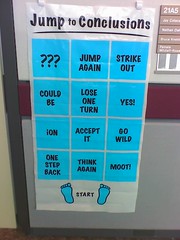 Hello? Anybody home?
Hello? Anybody home?
First things first — I am still alive and around.
Yes, this blog has been neglected as of recent months. But I have been around on Twitter, Skype, IM, and a few other places. I haven’t disappeared altogether. It’s just that I find it so hard to properly upkeep this blog when life gets insanely, ridiculously busy. I wish I could be the kind of person that hammers out blog posts whenever I have an idea. But I just can’t. Am I a slow-blogger? I’m not sure. I think it’s just that I am constantly in editing / re-writing mode. So, for me to write a quality post usually takes a long time — at least a couple of dedicated hours, and not fragmented hours. I need time all in one space to write.
Secondly — are you still here?
Is anyone still reading? Or have you all stopped checking into the blogosphere and simply are relying on Twitter and Facebook to keep you in the loop? And really — is anyone still reading my blog? I’ll be honest, if I were a reader of connect. create. question. , I’d be wondering what the heck is going on. So, here is what has been going on since May 15, 2009 (the date of my last post).
The Nut-shell Version
- The Final Four Weeks: Not only were the final weeks of the school year at UNIS Hanoi busy with exams, assessments, and clean-up like the end of any academic year, but they were particularly emotional for me as I prepared to leave UNIS and Hanoi, my home for the past three years. There is not enough space here for me to adequately describe my feelings about leaving. (I’m terrible at endings.) Let’s just say that it was difficult, scary, and yet exciting on so many levels. I was a bit of a mess for a little while, trying to sort through all the debris, both figurative and literal. Not to mention packing up my house, cats, and international life to return to the very developed world of the USA. I realize I am highly condensing a very intense time and by doing so I am probably not giving it the full respect it deserves, but I am not certain that this blog is the outlet for such things. Thus, I leave it at that for now…
- Travel: My final hurrahs in Asia included a lovely trip to Hoi An, a true getaway to my favorite island of Bali, and a brief check-in with a dear friend in Bangkok. All were fabulous, memorable, and a perfect send-off.
- The Death of the iBook: In the middle of a much-needed creative writing session — in fact, in the middle of the 2nd draft of a poem about the lessons of grief, inspired by Sark — my beloved 5-year-old iBook crashed and died, as I sat on the balcony of my bungalow on Nusa Lembongan, sipping a Bintan and gazing at the sunset. I cried.
- The Return: because my visa documents for study in the USA could not be sent to Vietnam (postal woes), I had to return to Canada for a few weeks. Plus, there’s family and friends of course, whom I wanted to see. I was able to take in the Calgary Folk Festival, a true treat, and mix & mingle with several cool people whom I love dearly. It was good to be home. I spent a week at my grandmother’s house and thoroughly enjoyed picking garden lettuce, playing bocce, and eating my grandmother’s cooking! Deeeee-lightful. Yet, the stress of The Visa Papers lingered… would they arrive in time?
- The Fall: shortly after my return to Calgary, I received word that one of my cats, Scout, had fallen off the balcony of the 8th-floor apartment where she was being cared for. She did not survive the fall. This heartbreak arrived the same day as I learned that Michael Franti had to cancel his Folk Festival show due to illness, and I got a $95 parking ticket because my ticket was not completely upright on the dashboard. It was a crappy day all around.
- The Move: within a very short time, It All Happened. The Visa Papers arrived, I booked a flight, and BOOM — I landed in NYC.
And Here We Are
So, I’ve been in NYC for about 3 weeks now. I have a (very small) apartment, and I am a registered full-time graduate student in NYU’s Educational Communication & Technology M.A. program. To say I am experiencing rapid lifestyle changes across the board would still be an understatement. I am adjusting to a major life upheaval. The main challenges for me so far, and in this order, are:
- adjusting to being in a very developed consumerist society, after having witnessed abject poverty in far-flung corners of this planet
- wrapping my head around being a full-time student, with no $ coming in and lots going out
- wrapping my head around being a full-time student in the 21st century, and understanding how to read, take notes, and BE a student in a tertiary program when it has been 11+ years since I’ve had to think about academia. I feel like I am learning a new language and modality, and it’s difficult.
- finding my niche in NYC, a huge intimidating city with many micro-communities
- managing my time between unpacking boxes and all this school work that is already piling up, while at the same time trying to make new friends (I know very few people here) and take in all that this city has to offer
- finding space in my Teeny Tiny Apartment for the whack of stuff I have accumulated over the last 8 years overseas — and that’s after 4 boxes already went in storage in Calgary. I have already called Manhattan Mini Storage for a quote…
The Education: What’s in Store
Classes started last week. So far, so good. (I still have not unpacked all my boxes, nor visited Ikea, but they will have to wait.) I haven’t even bought all my books yet. But my classes seem pretty cool and so do my classmates — a very diverse group of people from a plethora of backgrounds. My courseload this semester:
- Representation & Interaction Design for Learning
- Educational Design for Media Environments
- Cognitive Science and Educational Technology
- Professional Applications of Educational Media
(You can find descriptions of these courses here.)
So far I am finding my readings to be really heavy on the design aspect, which for me is good. Coming from an educator’s perspective, my understanding of the design process has all been about instructional design and I am quite comfortable with it. However, looking at design from the perspective of media and technology in learning is something new to me, and I daresay it’s one of the main reasons I’m here. 🙂 But more on that later. I will be blogging about my readings for several of these courses, and will save such thoughts for those posts.
Lastly
Thanks for reading, if you’re still kickin’ around! I can safely say that I will be blogging more often now that school has begun. Several of my professors have requirements for us to journal about what we read and learn (I love that they implement pedagogy like this) and I intend to use this space for some of that.
P.S. I do now have a new MacBook Pro and an iPhone, and quite happy about both!
Image credits:
Is Anybody Home? Free Girl Looking in Window by D Sharon Pruitt under this license
Bathmophobia III by Tarnishedrose under this license
 While on
While on 

